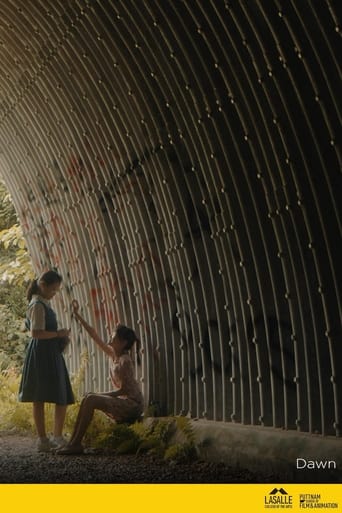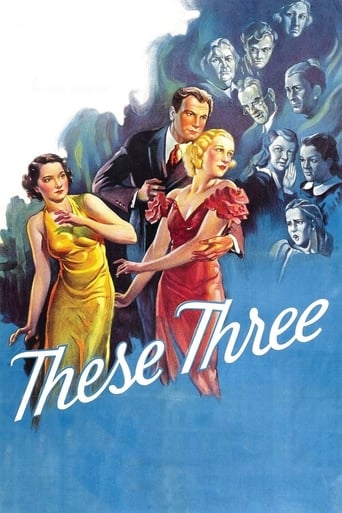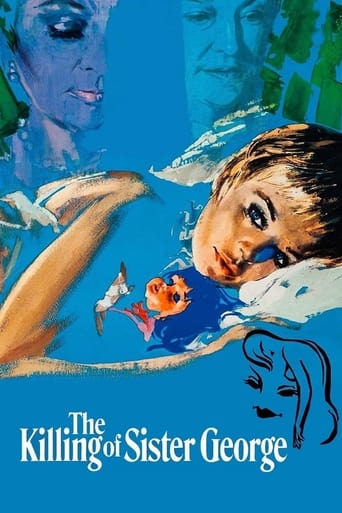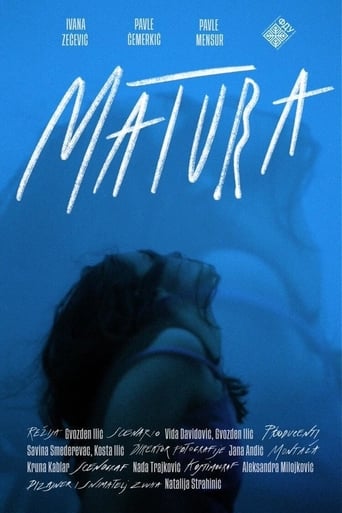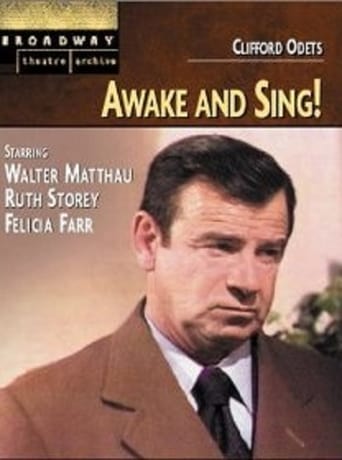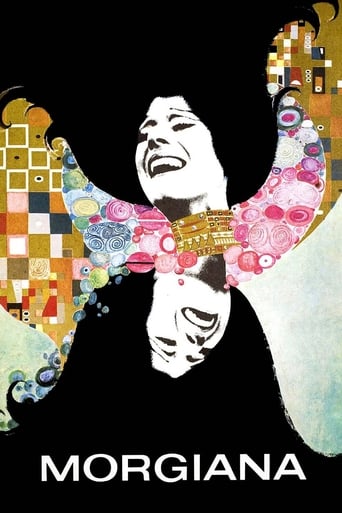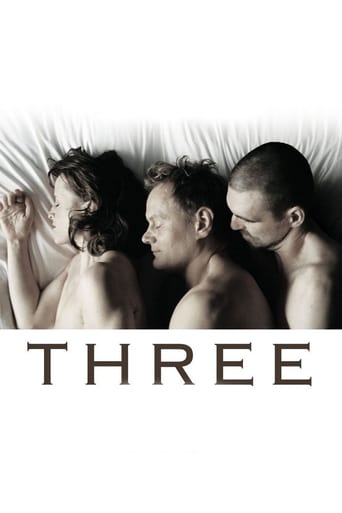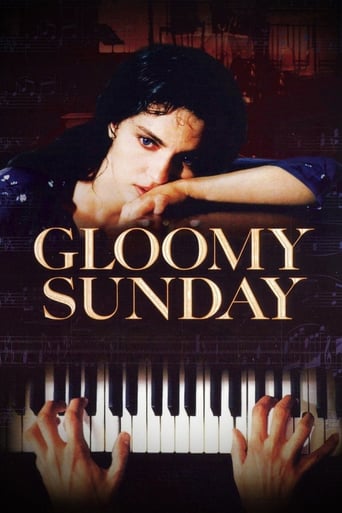
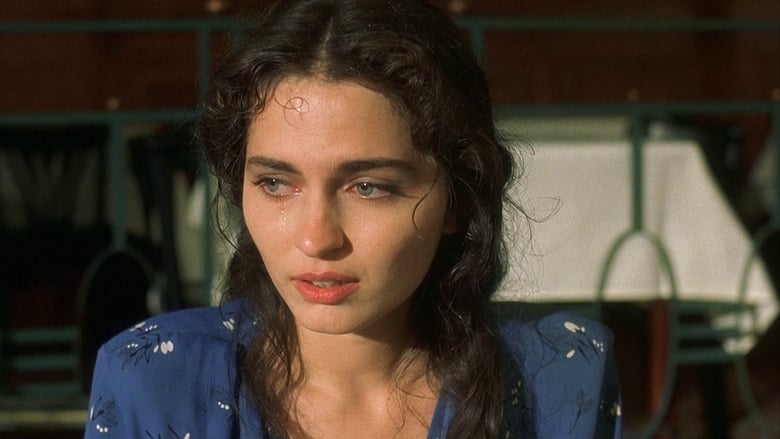
Gloomy Sunday (1999)
Budapest in the thirties. The restaurant owner Laszlo hires the pianist András to play in his restaurant. Both men fall in love with the beautiful waitress Ilona who inspires András to his only composition. His song of Gloomy Sunday is, at first, loved and then feared, for its melancholic melody triggers off a chain of suicides. The fragile balance of the erotic ménage à trois is sent off kilter when the German Hans goes and falls in love with Ilona as well.
Watch Trailer
Cast


Similar titles
Reviews
I wrote this brief review because it was the first movie I went to with my former partner in 2003, in that small cinema mentioned in trivia, in Christchurch, New Zealand, now destroyed by the earthquake of February 2011. She subsequently gave me a DVD of the movie which I went to watch the other night only to discover it is gone.So I guess this movie is especially poignant to me. But emotions aside, the reason it ran so long in Christchurch is that it very, very good, albeit not perfect. I will not go over the story line, which others have well commented upon. But what, IMHO, sets this movie aside is the haunting atmosphere, the complexity of the characters, and their relationships. Others will struggle with the German soundtrack and English subtitles but that, in my opinion, adds to its mystery.It is really two stories; one the love triangle, the other the outcome of the Nazi invasion of Hungary, but it does manage to pull these together at the end. It is a bit contrived but ultimately does work.The acting is a bit uneven (Hans, the SS officer is a bit off), but otherwise everything about this is great. You will probably never see this in a theatre or on television but for serious film collectors, this is highly recommended.
I haven't watched such a good movie for a while. It includes history, love, psychological aspects. The music is wonderful, the actors are brilliant. It keeps your attention and has an unexpected ending. The story plays before, during and after the second world war. The main characters work in a Budapest restaurant. The owner (he is Jewish) is in a relationship with the waitress. He, Laszlo, hires pianist Andras, and both men love Ilona, which is further complicated when their regular customer Hans, an SS colonel, begins to pursue Ilona's affections. Hans wants to marry her, but she refuses his offer. When Hans jumps into a river, Laszlo saves his life and Hans promises him to protect him from the Nazis. Andras the composer falls in love with Ilona, too. They share Ilona who loves them both. Andras composes a song - "Gloomy Sunday". It is published and soon famous. The bad thing is that more and more people who listen to it commit suicide. More and more Jewish people are deported. Hans who went back to Germany return as a Nazi officer.....
This is a highly superior and inspired film which concerns the connected lives of four people, an irresistibly alluring woman named Ilona and the three men who simultaneously love her. One of the unusual aspects of the film is that we are never told anything about the backgrounds of any of these people. The story starts where it starts, and there is no back-story provided at all. All of the four characters are deeply enigmatic, and we wish we knew more about them. It is a pity that the English title of this German language film is translated as GLOOMY Sunday, because the word 'gloomy' in English is the kiss of death to any sales of anything, being far too depressing, and the surest way to make certain that no one will want to buy the DVD. The phrase in German is 'traurige Sonntag', which really means 'sad Sunday', 'sombre Sunday', or even in modern terms, 'blue Sunday'. To mistranslate 'traurig' as 'gloomy' was a commercial catastrophe for the film's potential sales. (The French have been more sensible in translating the title more accurately as 'Sombre Dimanche'.) The film is based upon a 1988 novel by the German author Nick Barkow entitled (in English translation) 'A Song of Love and Death'. That is the title also given in the film to the theme song upon which much of the story is based, a melody composed by the young pianist Andras, played intensely by Stefano Dionisi. The melody is a genuine Hungarian song of 1933 composed by someone named Reszo Seress (which I noted in the film's credits), who has many photos of himself on the web and a Wikipedia entry giving his dates as 1899-1968, and explaining that he wrote the world-famous song but refused to leave Budapest to collect his American royalties but instead preferred to stay in his favourite restaurant called Kispipa as the pianist. (This restaurant in the film is called Szabo, and is shown as more up-market that the real one.) The real-life Seress also killed himself. Furthermore, Seress's song was indeed notoriously connected with a string of suicides apparently caused by women driven to despair by listening to his song (!), just as shown in the film. So the story of the film appears to be very close indeed to the truth. The casting of Hungarian actress Erika Marozsan as Ilona was a stroke of genius. At first, she appears somewhat unexceptional, but as the story proceeds we realize that we have fallen under her spell without realizing it, and that she is one of those women who gets under your skin and stays there. The three men in love with her are all more or less driven mad by their passionate adoration of her. Two of them, the restaurateur Szabo and his pianist Andras, agree to share her, so that a strange threesome develops. Joachim Kroel is a brilliant choice to play Szabo, as he is so unobvious, but ultimately so perfect, with a face which expresses so much without the need for speech. The third man in love with her, rejected by Ilona, is the sinister one, the German Hans Wieck, played to sinister perfection by Ben Becker. Naturally after going home to Germany, some time later he returns as a Nazi official. In the English subtitles, he is called a 'colonel', but in the German dialogue he is always referred to as Herr Standartenfuehrer, which was a party title, not an Army or SS rank, though it was roughly equivalent to a colonel in hierarchical terms. Earlier in the story, Szabo had saved Wieck's life when Wieck jumped off a bridge in Budapest to commit suicide in despair at Ilona rejecting him. So Wieck upon returning to Budapest with the occupying forces promises to protect Szabo, who is a Jew. The horrors of German-occupied Budapest, the corruption, bestiality and greed of the Nazi officials, and the roundup of the Jews begin to happen around the story and impinge upon the characters in extreme and threatening ways. This film is really a masterpiece of modern German cinema, beautifully and tastefully made, with tremendous emotional power and conviction. The director is Rolf Schuebel, most of whose work has been in television drama and documentaries, though in 2003 he directed a remarkable sci fi film entitled BLUEPRINT. This film has such a profoundly melancholy but intensely romantic atmosphere that it does not soon fade from the memory, and is a classic of its kind. The ending is a stunning surprise, and is directed with superb subtlety. This is truly a film for sophisticated viewers who can appreciate all the nuances.
Have seen this superb film twice no thanks to the poor distribution and availability on DVD.Beautifully made old style film with great plot, acting and characters. One of my favourite all time films. It is basically the story of a tragic love triangle set in Budapest during the war. The song "Gloomy Sunday" provides a constant atmospheric backdrop. Like others have commented it has a feel akin to Casablanca and if you enjoyed that classic film you should like this too.A pity that because it was made in German so few people in the UK and USA are likely to see it. Sad that whilst poor quality popcorn films with no plot or value are everywhere real quality like this is so hard to find.






